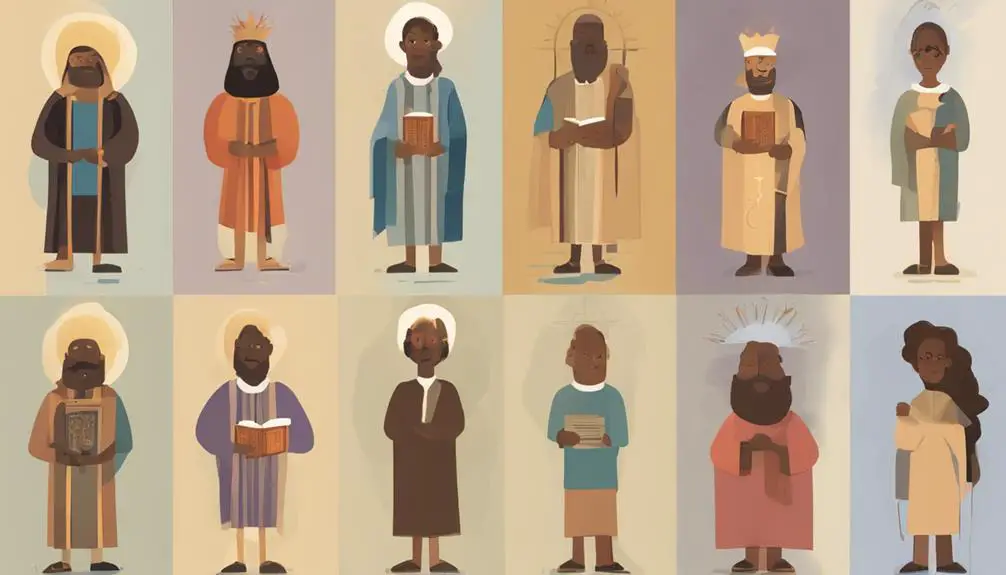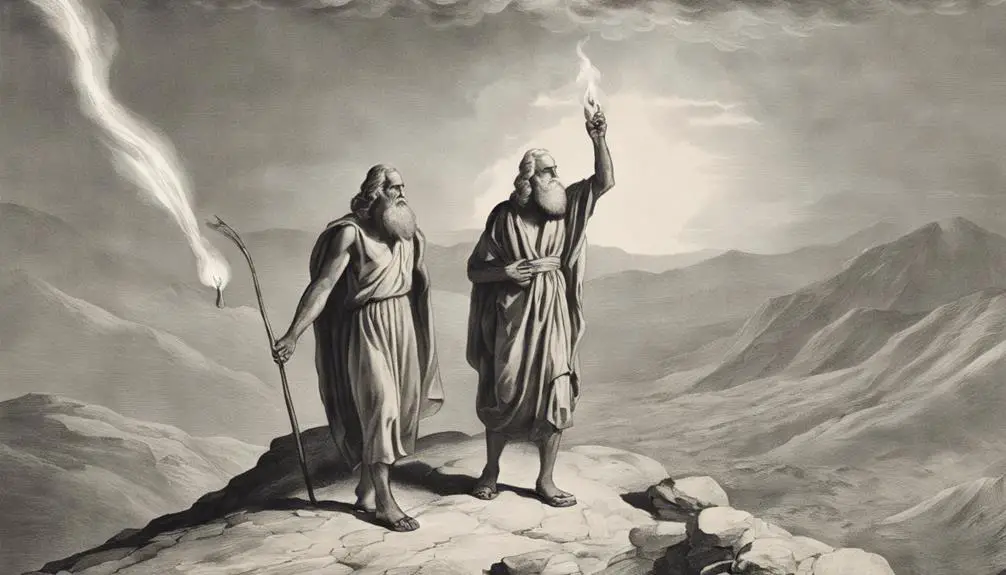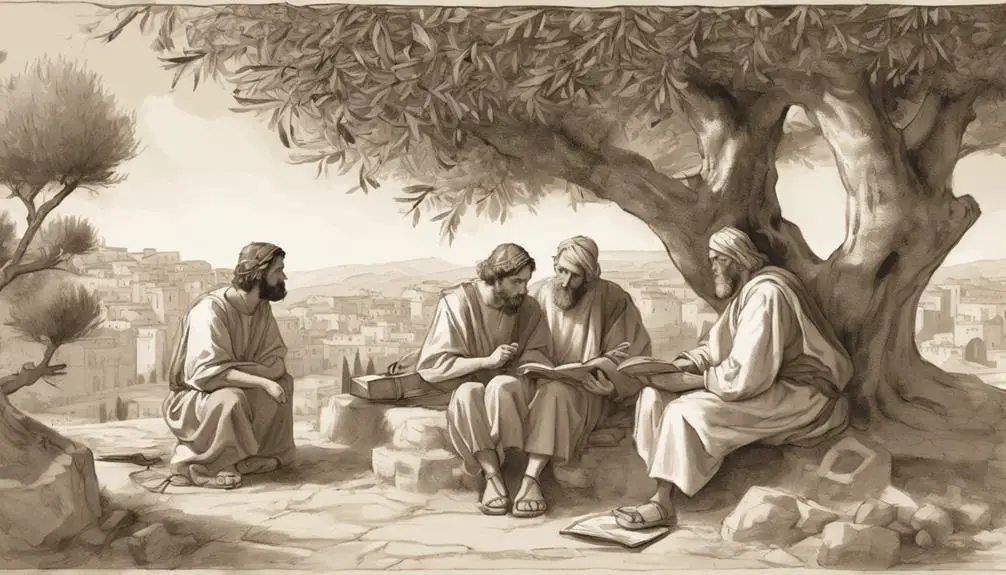Biblical mentor-mentee relationships reveal invaluable life lessons; discover the depth of these sacred bonds and the wisdom they impart.

List of Mentors and Mentees in the Bible
You might think you've heard it all when it comes to biblical stories, but the mentor-mentee relationships scattered throughout the Scripture can offer us fresh perspectives.
From Moses and Joshua's leadership handover to the spiritual bond between Jesus and His disciples, these pairs present valuable life lessons for us. As we explore these relationships, you'll find yourself intrigued by the depth of their connections and the wisdom they imparted.
But what exactly makes these partnerships so compelling? Stay tuned to find out more.
Key Takeaways
- Moses and Eli served as spiritual and leadership mentors to Joshua and Samuel, preparing them for their prophetic roles.
- Elijah's mentorship of Elisha entailed a transfer of spiritual authority and guidance in miracles.
- Jesus transformed His disciples from followers to leaders through innovative teachings and embodying virtues like love and humility.
- Paul's mentorship of Timothy exemplified transformation through spiritual guidance, leading Timothy from a timid believer to a bold Christian leader.
Moses and Joshua's Leadership Legacy

Delving into the rich tapestry of biblical narratives, you'll find the leadership legacy of Moses and Joshua as a compelling example of mentorship, marked by faith, courage, and profound wisdom. This transition of leadership, from Moses to Joshua, isn't merely a change of guard but a purposeful, divinely orchestrated passage of authority.
Moses' influence on Joshua was both spiritual and practical. As Moses' assistant, Joshua observed firsthand the challenges, victories, and profound faith of his mentor. Joshua was privy to Moses' intimate conversations with God, his strategic decision-making, and his unwavering commitment to the Israelites' welfare. Moses, in his wisdom, didn't just equip Joshua with skills but also instilled in him the principles of God-centered leadership.
This mentor-mentee relationship was steeped in faith and courage. Moses' faith in God and his courage in the face of adversity were qualities that Joshua would need to emulate as he took up the mantle. Thus, when the time came for the transition of leadership, Joshua wasn't just prepared, he was divinely equipped for the task. He stepped into Moses' shoes, carrying forward Moses' legacy, but also shaping his own.
Eli and Samuel's Prophetic Journey

Shifting our focus to another profound mentorship in the Bible, we find Eli and Samuel, whose relationship illuminates the transformative power of prophecy and divine guidance. Eli, a high priest of Shiloh, undertook the task of guiding young Samuel, who was destined to become one of Israel's leading prophets.
Eli's Priestly Duties involved teaching Samuel the nuances of serving in the house of God, while Samuel's Divine Visions offered an intimate connection with God. Despite Eli's own sons' corruption, he was able to provide a spiritual foundation for Samuel, demonstrating the power of mentorship.
Consider the table below, which highlights key aspects of their journey:
Mentorship Role |
Eli's Contribution |
Samuel's Growth |
|---|---|---|
Spiritual Guide |
Taught Samuel priestly duties |
Grew in divine understanding |
Prophecy Interpreter |
Explained Samuel's visions |
Became a leading prophet |
Moral Compass |
Showed integrity despite his sons' corruption |
Upheld righteousness |
Elijah and Elisha's Miraculous Connection

Transitioning to another monumental mentorship in the Bible, you'll discover the miraculous bond between Elijah and Elisha, a relationship characterized by spiritual inheritances, miraculous signs, and the passing of prophetic mantles. Elijah's Ascension marked a pivotal moment in this mentorship, where the protégé Elisha witnessed his mentor ascend to heaven in a whirlwind. This event was a testament to Elijah's divine appointment and his significant role in the narrative of sacred scripture.
Elisha requested a 'double portion' of Elijah's spirit before his ascension – not in greed, but in his desire to continue Elijah's prophetic ministry with an equal, if not greater, intensity. In granting Elisha's Double Portion, Elijah passed on his prophetic mantle, symbolizing a spiritual inheritance and the continuity of divine work. This act set a precedent for the transfer of spiritual authority, a concept deeply ingrained in Biblical tradition.
The mentorship between Elijah and Elisha provides a profound exploration of faith, loyalty, and divine calling. Their relationship, marked by miracles and spiritual inheritance, remains a compelling example of mentorship and discipleship, providing a template for spiritual successors throughout the ages.
Jesus and His Disciples' Spiritual Bond

In the New Testament, you'll find the spiritual bond between Jesus and His disciples, a relationship that arguably represents the most profound mentorship in biblical history. This bond wasn't merely one of teacher to student, but also of a spiritual guide leading His followers on an unprecedented journey of faith evolution.
Jesus' teaching methods were innovative and experiential, utilizing parables, miracles, and direct interactions to inspire and educate His disciples. He didn't simply impart wisdom; He modeled it, embodying the principles of love, compassion, and humility. This hands-on approach allowed the disciples to witness and internalize these values, transforming their beliefs and behaviors.
The disciples' faith evolution was a dynamic, transformative process, marked by periods of doubt, confusion, and enlightenment. However, through their shared experiences and Jesus' relentless guidance, they developed a robust, resilient faith. They transitioned from mere followers to leaders, ultimately becoming the foundation of the early Christian church.
In essence, the bond between Jesus and His disciples wasn't just a mentorship. It was a spiritual transformation, a journey of faith, and a testament to the power of impactful teaching. This relationship sets a profound example for spiritual mentorships throughout history.
Paul and Timothy's Theological Partnership

Continuing our exploration of mentor-mentee relationships in the Bible, we encounter the theological partnership between Paul and Timothy, which presents another compelling example of spiritual guidance and growth. The relationship between Paul and Timothy is a complex intertwining of spiritual mentorship and theological partnership, demonstrating the transformative nature of mentorship within the Christian tradition.
Paul's teachings had a profound impact on Timothy. Paul's instruction wasn't merely academic; it was a form of spiritual formation, shaping Timothy's understanding of faith, service, and the Christian mission. Through their correspondence, we see Timothy internalizing Paul's teachings, growing in faith and understanding, and eventually becoming a respected leader in his own right.
Timothy's spiritual growth under Paul's mentorship is remarkable. He transitions from a timid young believer to a bold proclaimer of the Gospel, embodying Paul's teachings in his own life and ministry. Furthermore, Paul's influence extends beyond Timothy, as Timothy's leadership and teachings have shaped the Christian tradition.
Frequently Asked Questions
What Were Some of the Challenges and Conflicts Faced by These Mentor-Mentee Relationships in the Bible?
You'll find that in the Bible, mentor-mentee relationships often faced challenges and conflicts. These ranged from mentorship sacrifices such as time and resources, to meeting biblical expectations like faithfulness and obedience.
For example, Moses and Joshua faced hurdles in leading a rebellious Israel, while Elijah and Elisha dealt with doubts and expectations during a time of spiritual decline.
These relationships, though challenging, played pivotal roles in shaping biblical history.
Are There Any Female Mentor-Mentee Relationships Highlighted in the Bible?
Yes, there are notable female mentor-mentee relationships in the Bible. One prominent example is Naomi and Ruth. Naomi's wisdom and guidance significantly influenced Ruth's life.
The role of gender in Biblical mentorship, particularly female mentoring, often reflects the cultural context of the time, offering a unique perspective on the social dynamics and values of the period.
How Did the Mentorship Impact the Personal Lives and Faith of the Mentees?
The mentorship deeply impacted the mentees' spiritual growth. Through the application of mentorship principles, they gained wisdom, understanding, and a deepened faith.
Their lives were enriched by their mentors' teachings, shaping their spiritual journey. They became influential figures themselves, spreading the word of the Lord.
Can We Find Any Examples of Unsuccessful or Problematic Mentor-Mentee Relationships in the Bible?
Yes, you can find examples of problematic mentor-mentee relationships in the Bible. One instance is Eli and his sons, where Eli's accountability as a mentor fell short, failing to correct his sons' disobedience. This led to their downfall.
Similarly, Saul and David's relationship started positively, but Saul's jealousy turned it sour. These cases highlight the complex dynamics and potential pitfalls in biblical mentor-mentee relationships.
How Are These Mentor-Mentee Relationships Relevant or Applicable to Modern-Day Christianity?
You're exploring how biblical mentor-mentee relationships are relevant to modern-day Christianity. They provide you with a model for mentorship in contemporary Christianity. By following biblical mentorship practices, you're learning from their successes and failures. This helps in cultivating spiritual growth, strengthening faith, and navigating challenging life situations.
Essentially, these relationships offer timeless lessons on discipleship, accountability, and spiritual guidance.
Conclusion
In the Bible, you've seen profound mentor-mentee relationships that shaped history. From Moses and Joshua's leadership legacy to Paul and Timothy's theological partnership, these bonds fostered growth, wisdom, and divine intervention.
These relationships aren't just historical anecdotes; they're powerful examples of mentorship's transformative potential. So, as you navigate your own journey, consider the biblical blueprint of mentorship. It's more than a guide; it's a testament to the power of teaching, learning, and growing together.



Sign up